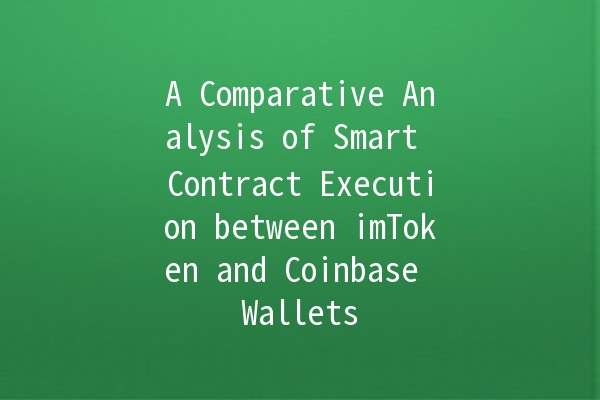In the everevolving landscape of cryptocurrency, wallets play a pivotal role in how users interact with blockchain technology. imToken and Coinbase are two notable wallets that have garnered significant attention. Both of these wallets offer support for smart contracts, but they do so in rather different ways. This article will delve into the nuances of smart contract execution in imToken and Coinbase, providing critical insights for users and developers alike.
Smart contracts are selfexecuting contracts with terms directly written into code. They are stored on the blockchain, meaning they can't be altered once deployed. This eliminates the need for intermediaries and provides a trustless way to conduct transactions. Both the imToken and Coinbase wallets have integrated smart contract capabilities, but their approaches differ in functionality and user experience.
One of the standout features of imToken is its userfriendly interface. Designed with accessibility in mind, it simplifies the process of interacting with smart contracts for users of all levels.

When creating a smart contract on imToken, users can easily fill out forms and set parameters without needing extensive technical knowledge.
imToken has strong support for decentralized applications (DApps). Users can browse and interact with various DApps directly within the wallet, enhancing their overall experience. This integration simplifies the process of using smart contracts, allowing transactions to be executed seamlessly.
Using a DApp for trading tokens on imToken allows users to execute trades through smart contracts without needing to leave the wallet.
Smart contracts on imToken can be executed quickly, but users need to be aware of gas fees. The wallet allows users to set gas prices, enabling them to optimize their transaction speed and costs based on current blockchain conditions.
A user can choose a higher gas fee during peak times to ensure swift execution of their smart contract, while opting for lower fees during quieter periods.
Coinbase's wallet interface is integrated with its exchange platform, allowing for seamless transactions between the wallet and their trading features. This makes it easy for users to convert assets and execute contracts with minimal friction.
A user can purchase Ethereum directly from Coinbase, store it in their wallet, and immediately interact with a smart contract, such as staking or yield farming.
Coinbase is known for its stringent security protocols. Smart contract execution within the Coinbase wallet benefits from the multilayer security features that the platform provides, including twofactor authentication and biometric access.
When executing a smart contract, users are prompted for additional verification, ensuring that even if their wallet is compromised, unauthorized transactions are still blocked.
Coinbase offers robust educational resources tailored for those new to cryptocurrency. This can be particularly useful for individuals looking to understand smart contracts without prior experience. Educational modules guide users through the concepts behind smart contracts and how to interact with them effectively.
A new user can complete Coinbase's educational module on smart contracts to grasp crucial concepts before attempting to create or execute contracts on the blockchain.
Before executing any smart contract, it is crucial to conduct thorough research. Familiarize yourself with the contract’s purpose, potential risks, and overall credibility. Understanding what you are interacting with can save you a lot of trouble in the long run.
Take advantage of test networks to practice executing smart contracts without risking actual funds. Both imToken and Coinbase allow for interactions on test networks, helping users to learn and experiment.
Blockchain technology is rapidly evolving. Stay updated with the latest trends, updates, and vulnerabilities related to smart contracts and wallets. This knowledge can provide you with a significant advantage.
Always prioritize security when interacting with smart contracts. Use strong passwords, enable twofactor authentication, and never share private keys. Additionally, regularly audit the smart contracts you engage with to ensure their integrity.
Engaging with community forums, such as Reddit or specialized Discord servers, can help expand your knowledge. You can share experiences, ask questions, and learn from the mistakes and successes of others.
The primary difference lies in the user experience and additional services offered. imToken focuses on DApp integration and userfriendly design, while Coinbase combines trading functionalities with security features.
Yes, both imToken and Coinbase provide interfaces that make it easy for nontechnical users to execute smart contracts. ImToken has a straightforward design, while Coinbase offers educational resources.
Both wallets employ robust security measures. However, users must remain vigilant and take personal security seriously, as wallet security also relies on user practices.
You can optimize gas fees by setting appropriate gas limits based on current network conditions. Both wallets allow users to manually adjust these settings.
If a smart contract fails, it typically doesn’t execute, and users will often retain their funds. However, any gas fees incurred during the attempt to execute the contract may still be lost.
Both imToken and Coinbase offer educational resources on their respective platforms. Additionally, online courses and community forums are excellent places to gain indepth knowledge.
By thoroughly understanding the nuances of smart contract execution in both imToken and Coinbase, users can make informed decisions that enhance their cryptocurrency experience. Whether you prioritize userfriendliness, integration with exchanges, or security measures, each wallet provides unique advantages tailored to different user needs. By leveraging the tips outlined above, users can maximize their productivity and security when interacting with smart contracts.